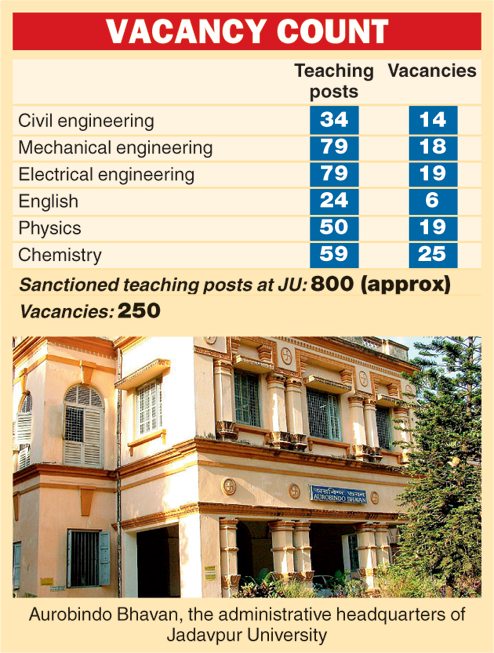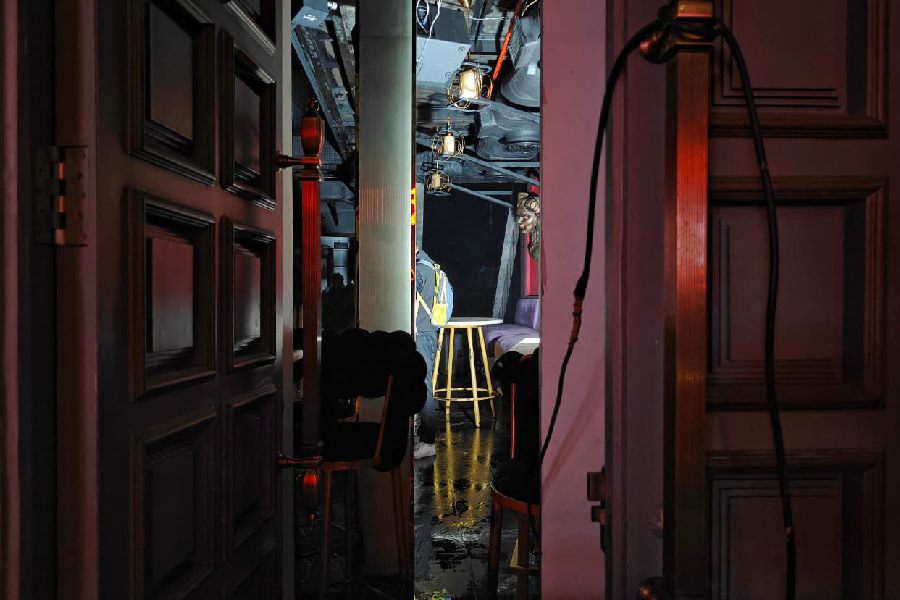
About a third of the teachers' posts have been vacant in Jadavpur University for the past few years because of a freeze in recruitment triggered by a change in rules and exit of two vice-chancellors within a year.
JU officials said the number of vacancies in the faculty has touched an unprecedented 250. The university has around 800 teaching posts.
The vacancy in some departments is as high as 35 per cent, sources said.
The shortage has been on the rise in all three wings - engineering, science and arts - over the past four years. "What worries us the most are the vacancies in the engineering departments as they are considered to be among the best in the country," a JU official said.
The civil engineering department has 34 sanctioned posts, of which 14 are vacant. In the mechanical engineering department, 18 of the 79 full-time teaching posts are vacant. The electrical engineering department has 60 full-time teachers against the sanctioned strength of 79.
The English department, one of the most sought-after in the university, has 24 full-time teaching posts, of which six are vacant.
The situation in the science departments is no better. Of the 50 sanctioned posts of full-time teachers for physics, as many as 19 are vacant. The corresponding figures for chemistry are 59 and 25, respectively.
Officials said the process of recruiting teachers at JU has remained suspended since 2010, when the University Grants Commission (UGC) had changed the eligibility criteria for appointment of college and university teachers.
Whenever the UGC sets new guidelines, the state governments and the universities financially aided by them are required to revise their recruitment criteria.
The JU failed to change its hiring criteria in compliance with the revised UGC criteria before the May 2011 Assembly elections.
The process got further delayed after the Trinamul Congress came to power as the new government announced plans to come up with a new education policy and amend the acts governing the aided universities.
It was around mid-2013, during the tenure of Souvik Bhattacharyya as vice-chancellor, that the university completed altering its recruitment rules.
But before recruitments could start, Bhattacharyya quit as VC in October 2013.
Abhijit Chakrabarti took over as interim VC following Bhattacharyya's resignation, but recruitments could not start in the absence of a full-term head.
Chakrabarti became full-term VC in October 2014 and took an initiative to start recruitment.
But the process never gained momentum because of prolonged agitation by students and teachers, who were pressing for Chakrabarti's resignation because of police action on protesting students on the campus on the night of September 16 2014.
Chakrabarti resigned in January, following which pro-VC Ashis Verma took over as acting VC. But Verma as acting VC lacks the authority to supervise teacher recruitment.
Verma admitted the difficulties faced by several departments because of the vacancies. "I was unable to start the recruitment process as acting VC. I am only authorised to look after the day-to-day administrative functioning of the university," he said.
Calcutta University VC Suranjan Das is set to take over as the full-term head of Jadavpur University by July 15.
Verma expressed the hope that recruitment would start soon after the new VC takes over.
In any state-aided institution like JU, 10-15 per cent vacancies in faculty is nothing unusual. At JU, officials said, the figure never crossed 10 per cent of the total strength.
"What is alarming about the present situation is that the problem has been persisting and positive steps are not being taken to fill up the vacant posts. The standard of education JU is famous for, especially in the engineering departments, is bound to decline if the vacancies are not filled up," Partha Pratim Biswas, a professor of construction engineering, said.
What has compounded the problem is the Mamata Banerjee government's decision in 2013 to introduce 17 per cent reservation of seats for OBC students in institutions of higher learning.
The institutes were asked to keep adding a certain number of seats every year to accommodate the quota students.
The government had also promised that additional teaching posts would be sanctioned to take care of the increased student intake.
"Let alone creating more posts, even existing vacancies are not being filled up. Yet the number of seats is being increased in almost every department over the past three years," a teacher in the science faculty said.











